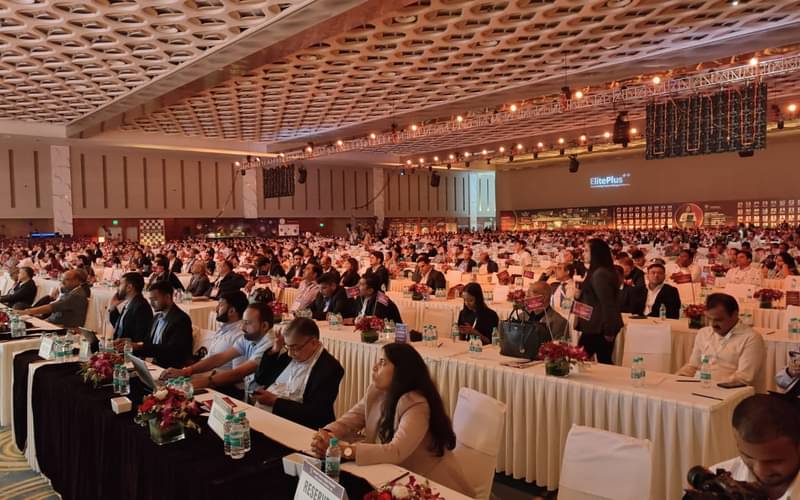ElitePlus Summit: Plastic industry's push for circularity and sustainability in India
Alright, here is the lowdown, a perspective on the plastic game. We are at the ElitePlus 12th Annual Speciality Films and Flexible Packaging Global Summit.
03 Sep 2025 | By Sai Deepthi P
The show is about to start. We are sauntering past the 99 stalls at the show. ElitePlus veterans say, after the first day's lunch session, most of the traffic will shift to the stalls and the pre-function area. At the stalls, we see some interesting moves happening in sustainable packaging, and it is quite clear that it is not just greenwashing. Companies are genuinely feeling the heat from regulators and consumers to clean up their act.
Looking at the examples at various stalls — we see samples from iodised salt to bottled water, and even the global player in carbonated soft drinks — we are seeing a clear push towards mono-polymer materials, primarily PET and PE. This is a common-sense move because it simplifies recycling. The old multilayer laminates (PET/PE) were a nightmare for recyclers, often ending up in landfills.
Meanwhile, PE continues to evolve. Shifting to a single type of plastic, like the PE/PE laminate to pack salt, is smart, or exclusive use of mono-polymer PET, HDPE, and LDPE for bottled water, makes it much easier to process and reuse. The key is how the materials with low density behave on processing machines and packing machines.
The numbers speak for themselves. A Hyderabad-based flexible packaging converting major talks of how a PE/PE laminate can prevent plastic use and convert approximately 3000-MT from single-use to recyclable. Likewise, there is the Spectalpac stall. The Bengaluru-based digital print specialist is notching up two million impressions over the last two to three months. This amounts to almost full utilisation of the press.
Many brands (Indian and global) are moving to 100% recyclable PET bottles, including achieving 100% rPET inclusion in some designs. At the recently concluded Anuga FoodTec, we saw how players like Syntegon (previously part of the Bosch Group) offered solutions for beverage production, which can include cold filling technology for a range of liquid products. This means the beverage brands can engineer their drinks for a cold-fill process to overcome the technical issues of using rPET in hot-fill bottles. This shows a deep dive into the technical challenges of using recycled content and finding innovative solutions. Their lightweight design and optimised, recycle-friendly label are also key wins for reducing material usage and aiding the recycling process.
No wonder the PET recycling industry had a turnover of INR 5,000-crore in 2020-21. This has increased to INR 7,000-crore plus in 2023-24. Today, India has one of the highest PET recycling rates at 92% which competes with the best nation-states globally. The Indian recycling industry consists of unorganised and organised recyclers.
In addition, there are value-added recycled products made from rPET. At present, the Indian PET recycling industry is projected to grow at 15-20% per annum in the coming years. It is estimated that the Indian PET recycling industry will have a turnover of INR 10,000-crore plus in the next two to three years’ time. In addition to traditional mechanical recycling, there is an interest in chemical and biochemical (Enzymatic) recycling for difficult-to-recycle PET packaging and other polyester materials like textiles.
This is another significant step. But as one of the packaging gurus told us, PET is the superstar of the plastic universe. The other flexible packaging materials need to do more. Today, 80% of mismanaged plastic waste is flexible. Existing streams cannot process this in sufficient volumes.
An industry expert who spoke to us over coffee and croissants said, "From an industry perspective, the sustainable packaging market is on a growth trajectory.” We are seeing a push driven by governmental programs and a growing awareness of the plastic waste crisis. Which is perhaps why we see paper and paperboard advocacy at the ElitePlus conference.
As we wait for the show to begin, one trend is clear: the Indian plastic industry is being forced to evolve. The days of cheap, disposable plastic are numbered. The future is in designing for circularity, investing in recycling infrastructure, and educating consumers. The companies that can innovate and adapt to these changes will be the ones that thrive in the long run.
Now let's see what the two days have to unfold, along with 2,200 delegates from 800 organisations and 25 countries.


